Tragödie/Tragedy (Carl Froelich, 1925) is a lost film. None of the sources gives a plot of the film, but the title says it all. Because of her past (the letter!), Henny Porten loses her wealthy life as a countess and her dearly beloved daughter. I think the last postcard of the two Ross Verlag series is the most beautiful one: it shows the elegant but desperate Henny in tears. Tragödie is indeed a tragedy, and confirms why Henny Porten was one of the most popular German screen stars of the 1910s and 1920s.
![Henny Porten in Tragödie (1925)]()
German postcard by Ross Verlag, no. 41/1. Photo: Henny-Porten-Film. Publicity still of Henny Porten as Countess Maria Tamar, Walter Janssen as Count Tamar and Annemarie Winkler as their daughter Monica in Tragödie (Carl Froelich, 1925).
![Henny Porten in Tragödie (1925)]()
German postcard by Ross Verlag, no. 41/2. Photo: Henny-Porten-Film. Publicity still of Henny Porten in Tragödie (Carl Froelich, 1925).
![Henny Porten in Tragödie (1925)]()
German postcard by Ross Verlag, no. 41/4. Photo: Henny-Porten-Film. Publicity still of Henny Porten and Annemarie Winkler in Tragödie (Carl Froelich, 1925).
![Henny Porten and Walter Janssen in Tragödie (1925)]()
German postcard by Ross Verlag, no. 41/5. Photo: Henny-Porten-Film. Publicity still of Henny Porten and Walter Janssen in Tragödie (Carl Froelich, 1925).
Tragödie/Tragedy (Carl Froelich, 1925) was produced by Henny Porten's own film production company Henny-Porten-Film. Porten had founded in 1919 in a period when several stars started their own film studio. Most of them were finished after one or two films but Henny-Porten-Film flourished. But during 1923-1924 she was seen as 'box office poison, and could only find work with difficulty.
Henny Porten achieved a renewed comeback with the melodrama Mutter und Kind/Mother and Child (1924), produced and directed by Carl Froelich. On the 26 September 1924, the company Henny Porten-Froelich Produktion GmbH was founded in Berlin, in which Porten, Froelich and Porten's husband Wilhelm von Kaufmann were associates. Till 1929, the company made fifteen star vehicles for Porten, all directed at the general public. Tragödie/Tragedy was one of them.
Hans-Michael Bock writes in his encyclopedia of the German cinema, The Concise Cinegraph: "These films were often solidly produced, but mostly comprised formulaic narratives, such as the maternal melodramas Mutter und Kind (Mother and Child, 1924) and Mutterliebe (Mother Love, 1929)."
Henny Porten used to play women who found fulfilment in serving others and in self-sacrifice, who indulged in submission even against their will. Her films exposed the social repression that patriarchy exercised over women, showed how women with extramarital relationships or who were single mothers were separated from social life, and showed unequal competition between men and women at work.
Porten's personal life also became a tragedy after 1933. Her refusal to divorce her Jewish husband increasingly narrowed her film options. She had only six small roles by 1943. In 1937 she was taken on by the Tobis company on a work for money basis, but was never offered any work.
Carl Froelich joined the Nazi party in 1933. His company became an associate partner of the state-controlled Ufa film studio. From 1939 on, Froelich was in charge of the Gesamtverband der Filmherstellung und Filmverwertung ("Union of Film Manufacture and Film Evaluation").
In 1934, Froelich directed Ich für Dich – Du für mich on behalf of the Ministry of Propaganda. The film depicted women’s involvement in the state labour service. As a producer of entertainment films, Froelich adjusted to the 'new spirit of National Socialism'. In 1937, he was appointed professor, and in 1939, he was appointed president of the Reichsfilmkammer, a public corporation that regulated the German film industry between 1933 and 1945. After the end of the war, Froelich was arrested and 'de-Nazified' in 1948.He died in 1953.
![Henny Porten in Tragödie (1925)]()
German postcard by Ross Verlag, no. 1192/1. Photo: Henny-Porten-Film. Publicity still of Henny Porten in Tragödie (Carl Froelich, 1925).
![Henny Porten in Tragödie]()
German postcard by Ross Verlag, no. 1192/2. Photo: Henny-Porten-Film. Publicity still of Henny Porten in Tragödie (Carl Froelich, 1925).
![Henny Porten in Tragödie (1925)]()
German postcard by Ross Verlag, no. 1192/3. Photo: Henny-Porten-Film. Publicity still of Henny Porten in Tragödie (Carl Froelich, 1925).
![Henny Porten in Tragödie (1925)]()
German postcard by Ross Verlag, no. 1192/4. Photo: Henny-Porten-Film. Publicity still of Henny Porten in Tragödie (Carl Froelich, 1925).
![Henny Porten in Tragödie (1925)]()
German postcard by Ross Verlag, no. 1192/5. Photo: Henny-Porten-Film. Publicity still of Henny Porten in Tragödie (Carl Froelich, 1925).
![Henny Porten in Tragödie (1925)]()
German postcard by Ross Verlag, no. 1192/6. Photo: Henny-Porten-Film. Publicity still of Henny Porten in Tragödie (Carl Froelich, 1925).
Sources: Hans-Michael Bock (The Concise Cinegraph), Filmportal.de, Wikipedia and IMDb.
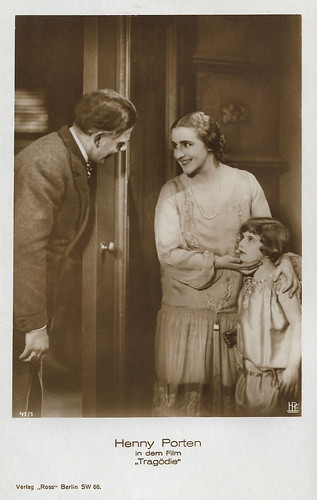
German postcard by Ross Verlag, no. 41/1. Photo: Henny-Porten-Film. Publicity still of Henny Porten as Countess Maria Tamar, Walter Janssen as Count Tamar and Annemarie Winkler as their daughter Monica in Tragödie (Carl Froelich, 1925).
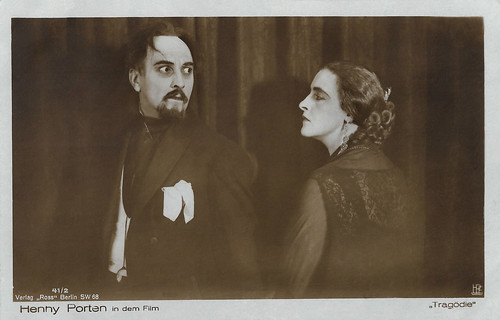
German postcard by Ross Verlag, no. 41/2. Photo: Henny-Porten-Film. Publicity still of Henny Porten in Tragödie (Carl Froelich, 1925).
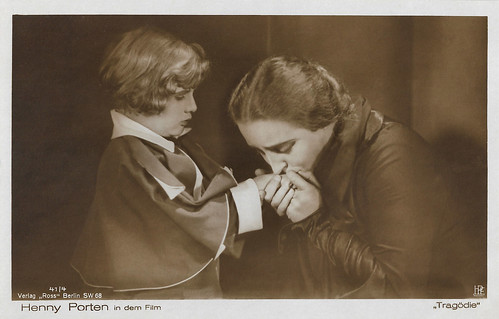
German postcard by Ross Verlag, no. 41/4. Photo: Henny-Porten-Film. Publicity still of Henny Porten and Annemarie Winkler in Tragödie (Carl Froelich, 1925).
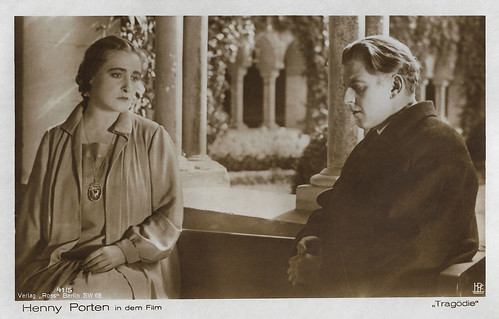
German postcard by Ross Verlag, no. 41/5. Photo: Henny-Porten-Film. Publicity still of Henny Porten and Walter Janssen in Tragödie (Carl Froelich, 1925).
The social repression by patriarchy over women
Tragödie/Tragedy (Carl Froelich, 1925) was produced by Henny Porten's own film production company Henny-Porten-Film. Porten had founded in 1919 in a period when several stars started their own film studio. Most of them were finished after one or two films but Henny-Porten-Film flourished. But during 1923-1924 she was seen as 'box office poison, and could only find work with difficulty.
Henny Porten achieved a renewed comeback with the melodrama Mutter und Kind/Mother and Child (1924), produced and directed by Carl Froelich. On the 26 September 1924, the company Henny Porten-Froelich Produktion GmbH was founded in Berlin, in which Porten, Froelich and Porten's husband Wilhelm von Kaufmann were associates. Till 1929, the company made fifteen star vehicles for Porten, all directed at the general public. Tragödie/Tragedy was one of them.
Hans-Michael Bock writes in his encyclopedia of the German cinema, The Concise Cinegraph: "These films were often solidly produced, but mostly comprised formulaic narratives, such as the maternal melodramas Mutter und Kind (Mother and Child, 1924) and Mutterliebe (Mother Love, 1929)."
Henny Porten used to play women who found fulfilment in serving others and in self-sacrifice, who indulged in submission even against their will. Her films exposed the social repression that patriarchy exercised over women, showed how women with extramarital relationships or who were single mothers were separated from social life, and showed unequal competition between men and women at work.
Porten's personal life also became a tragedy after 1933. Her refusal to divorce her Jewish husband increasingly narrowed her film options. She had only six small roles by 1943. In 1937 she was taken on by the Tobis company on a work for money basis, but was never offered any work.
Carl Froelich joined the Nazi party in 1933. His company became an associate partner of the state-controlled Ufa film studio. From 1939 on, Froelich was in charge of the Gesamtverband der Filmherstellung und Filmverwertung ("Union of Film Manufacture and Film Evaluation").
In 1934, Froelich directed Ich für Dich – Du für mich on behalf of the Ministry of Propaganda. The film depicted women’s involvement in the state labour service. As a producer of entertainment films, Froelich adjusted to the 'new spirit of National Socialism'. In 1937, he was appointed professor, and in 1939, he was appointed president of the Reichsfilmkammer, a public corporation that regulated the German film industry between 1933 and 1945. After the end of the war, Froelich was arrested and 'de-Nazified' in 1948.He died in 1953.
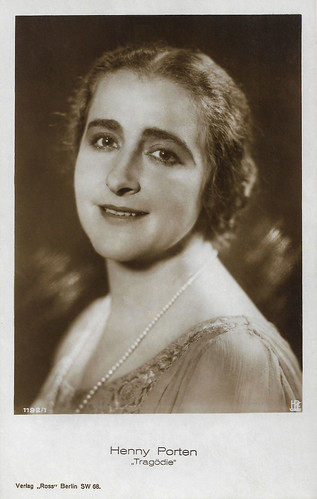
German postcard by Ross Verlag, no. 1192/1. Photo: Henny-Porten-Film. Publicity still of Henny Porten in Tragödie (Carl Froelich, 1925).
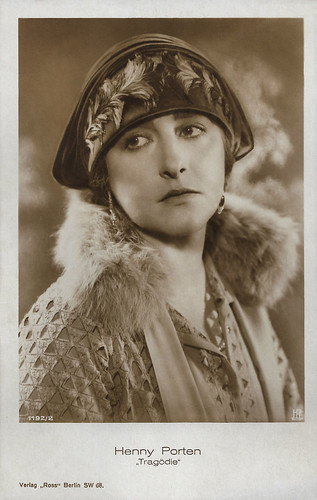
German postcard by Ross Verlag, no. 1192/2. Photo: Henny-Porten-Film. Publicity still of Henny Porten in Tragödie (Carl Froelich, 1925).
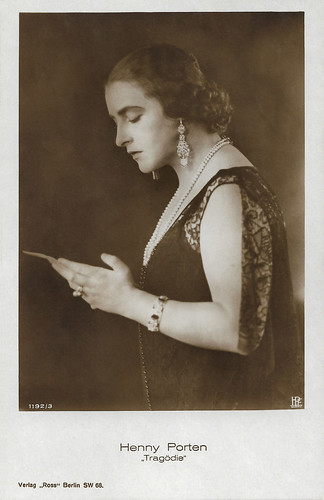
German postcard by Ross Verlag, no. 1192/3. Photo: Henny-Porten-Film. Publicity still of Henny Porten in Tragödie (Carl Froelich, 1925).
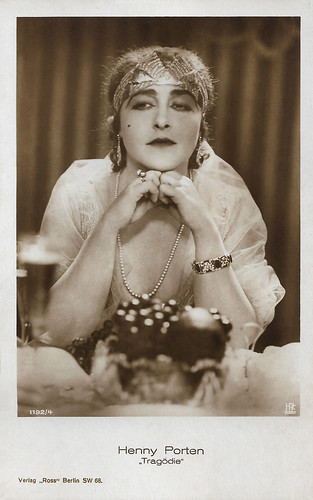
German postcard by Ross Verlag, no. 1192/4. Photo: Henny-Porten-Film. Publicity still of Henny Porten in Tragödie (Carl Froelich, 1925).
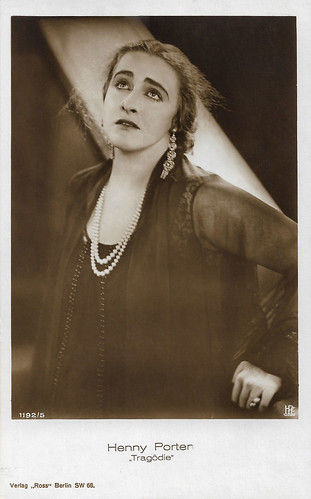
German postcard by Ross Verlag, no. 1192/5. Photo: Henny-Porten-Film. Publicity still of Henny Porten in Tragödie (Carl Froelich, 1925).
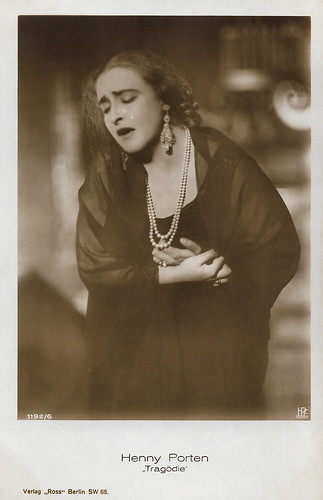
German postcard by Ross Verlag, no. 1192/6. Photo: Henny-Porten-Film. Publicity still of Henny Porten in Tragödie (Carl Froelich, 1925).
Sources: Hans-Michael Bock (The Concise Cinegraph), Filmportal.de, Wikipedia and IMDb.